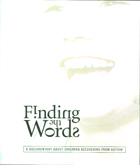
Finding the Words 2008
Distributed by The Video Project, PO Box 411376, San Francisco, CA 94141-1376; 800-475-2638
Produced by Elizabeth Horn
Directed by Elizabeth Horn
DVD, color, 60 min.
Sr. High - Adult
Health Sciences, Parenting
Date Entered: 11/03/2009
Reviewed by Lori Widzinski, Health Sciences Library, University at Buffalo, State University of New YorkFinding the Words is an outstanding film about how our traditional views of autism are being challenged by new research and new ways of thinking about the disease. The epidemiology is presented through the case studies of several families whose children were diagnosed with autism at a very young age—most after receiving the measles, mumps, rubella (MMR) vaccine. While this association has been controversial for years, the evidence presented in this film makes a strong case for a direct link. The filmmakers are careful not to make a statement condemning the vaccine, and the main idea of the film is that autism can be successfully treated, but the substantiation is there.
The cases presented in this film portray a variety of babies who were perfectly normal until they received their MMR shots at about 2 months of age. Most became very ill with fevers, upper respiratory infections, chronic ear infections and severe diarrhea. Behavior changes soon followed as did the diagnosis of autism. Hypotheses are given for the epidemic of autism we have in our country and the staggering statistics are irrefutable—in 1980 there were 1 in 10,000 diagnosed with autism; in 2004, 1 in 166—1 in 33 boys has a spectrum disorder.
There is hope, however, and that’s what Finding the Words is really all about. At the parental level it means not giving in to the diagnosis of autism from mainstream medical authorities, and not giving up on finding the right treatment for a child. Through a network of healthcare workers—therapists, doctors, and researchers—help is available. The success stories of the families represented here are proof that there is a way to be victorious in the fight against the disease. At the system level, the strongest message of the film is that we need to stop thinking of autism as a developmental problem, and to start thinking about it as a physical disease. That one change in approach will have a significant impact on changing the course of the disease.
Finding the Words is not unbiased in its message, but it is filmed expertly so that viewers will recognize it and still make up their own minds. It is highly recommended for academic library collections supporting the health sciences, social sciences and child development. It is accessible enough for a general audience and will also be at home in public libraries.